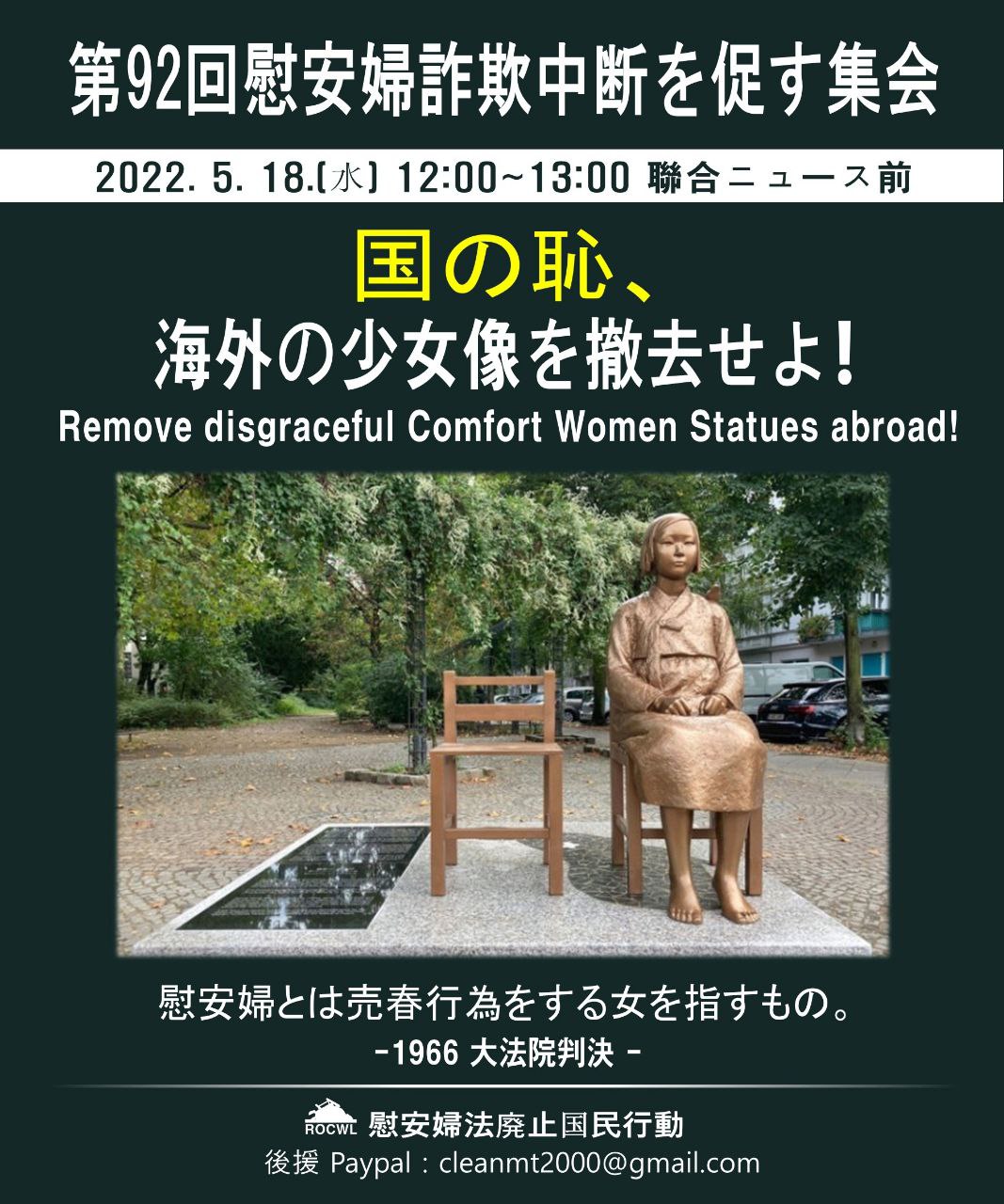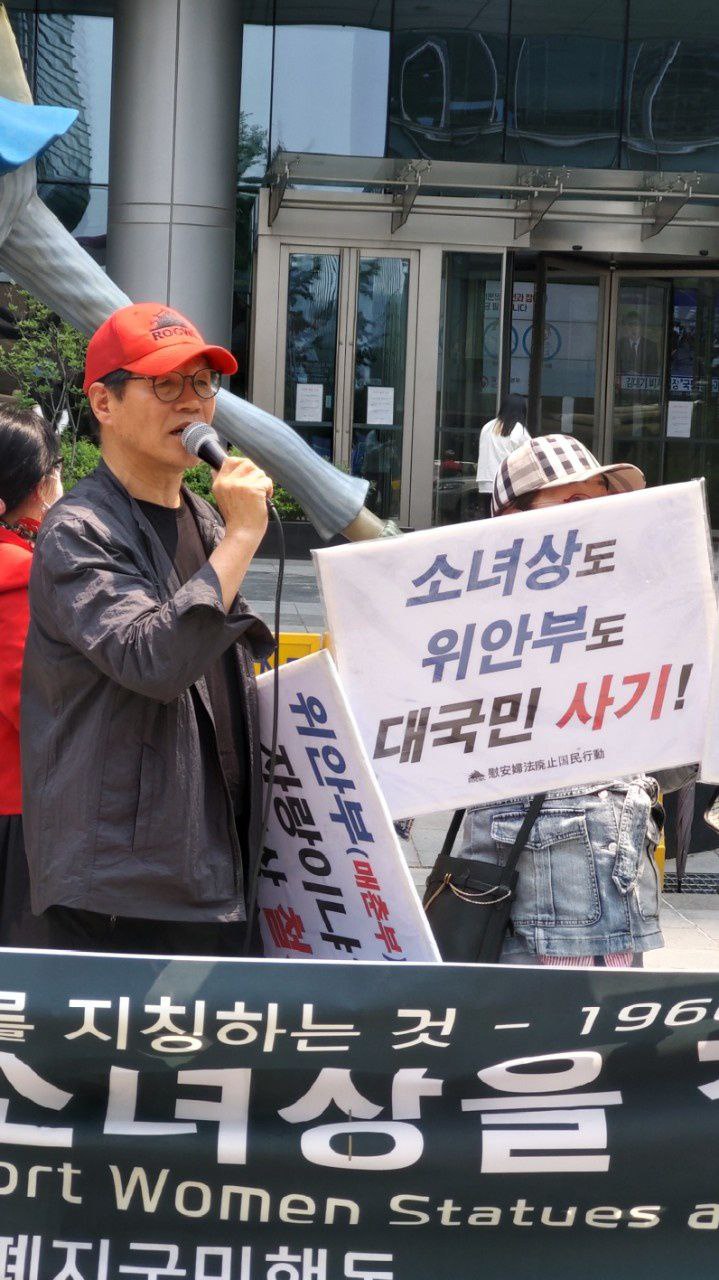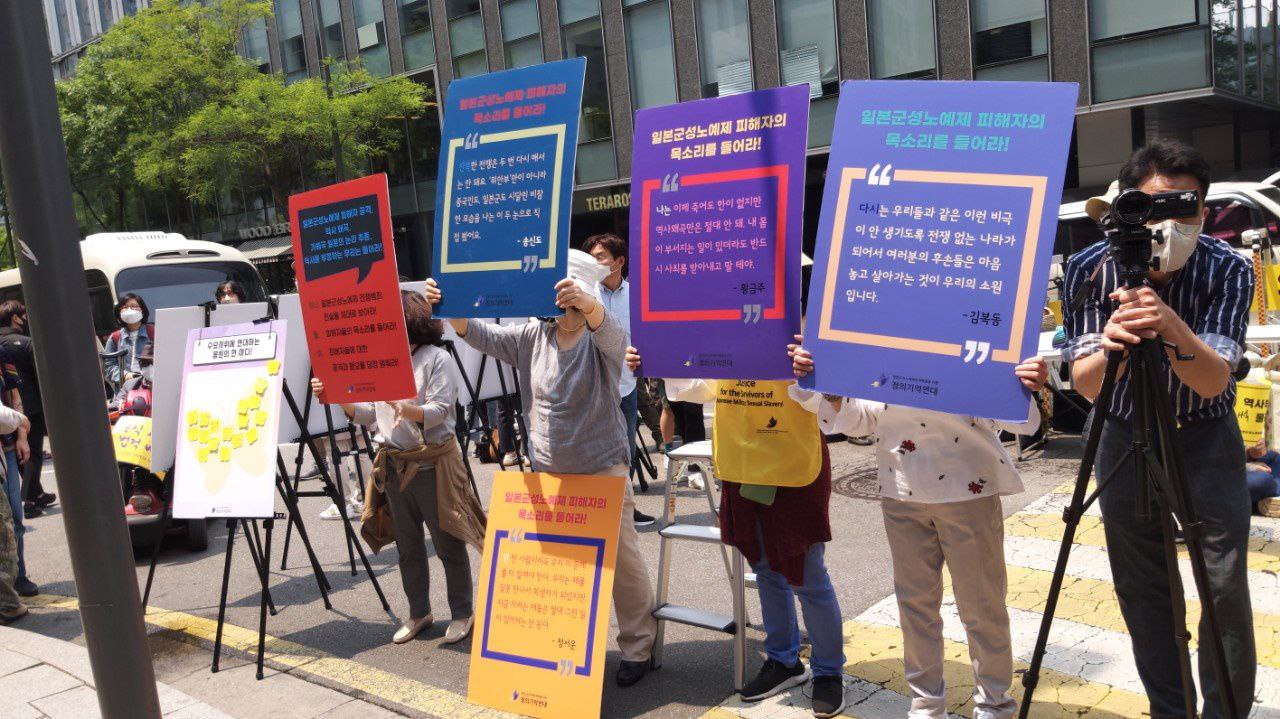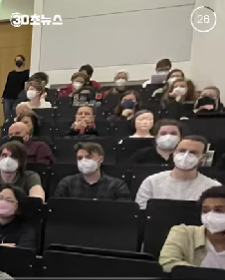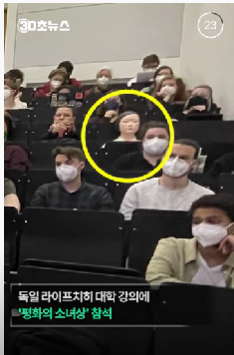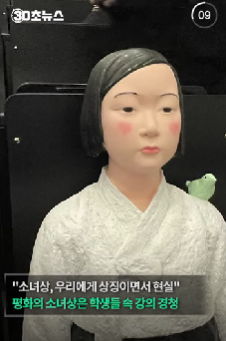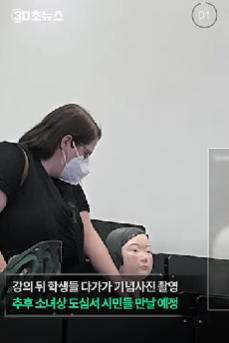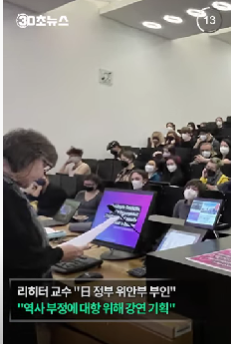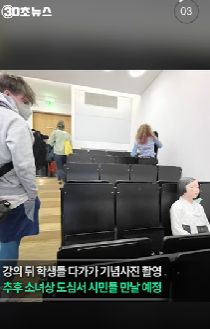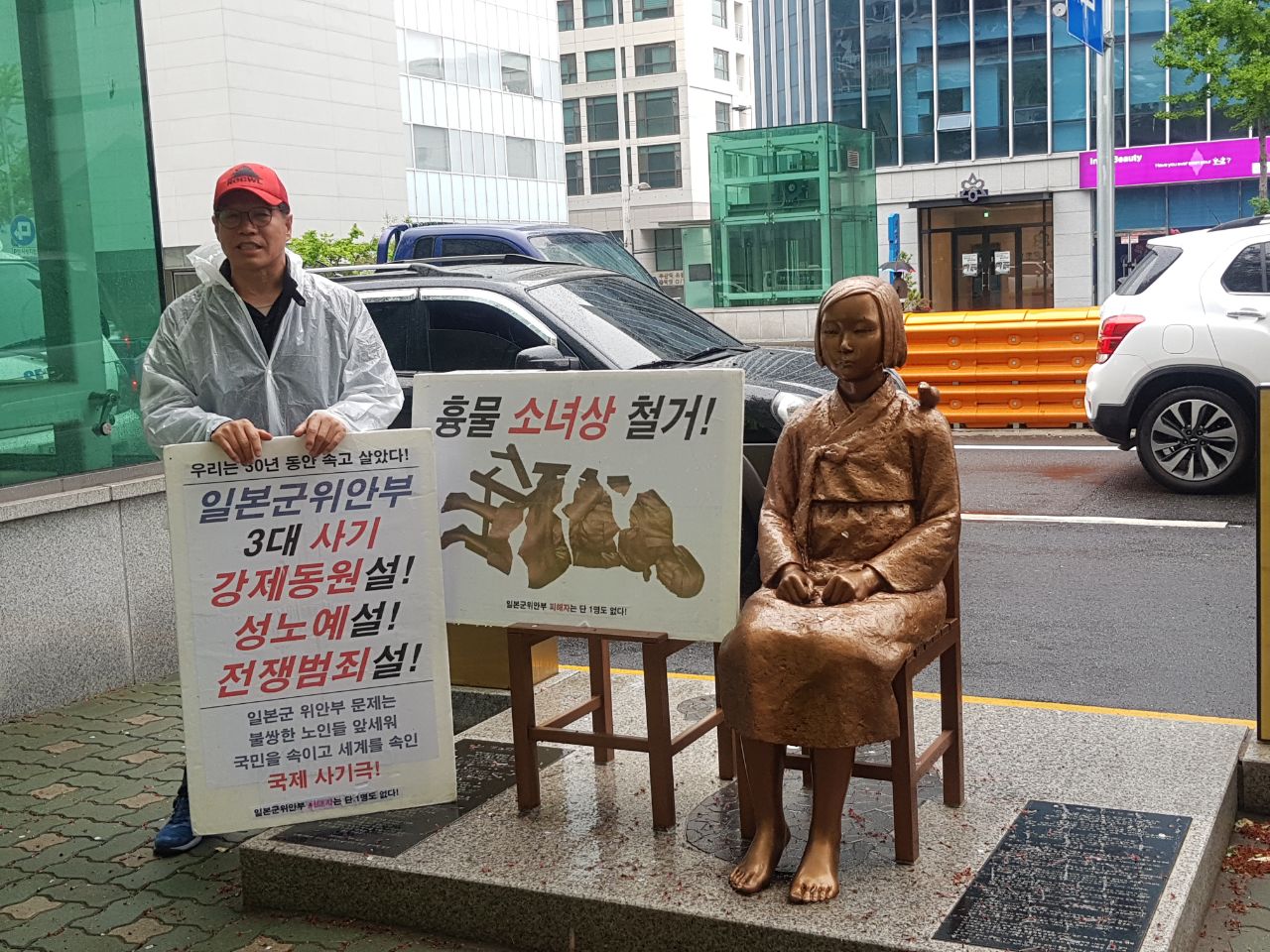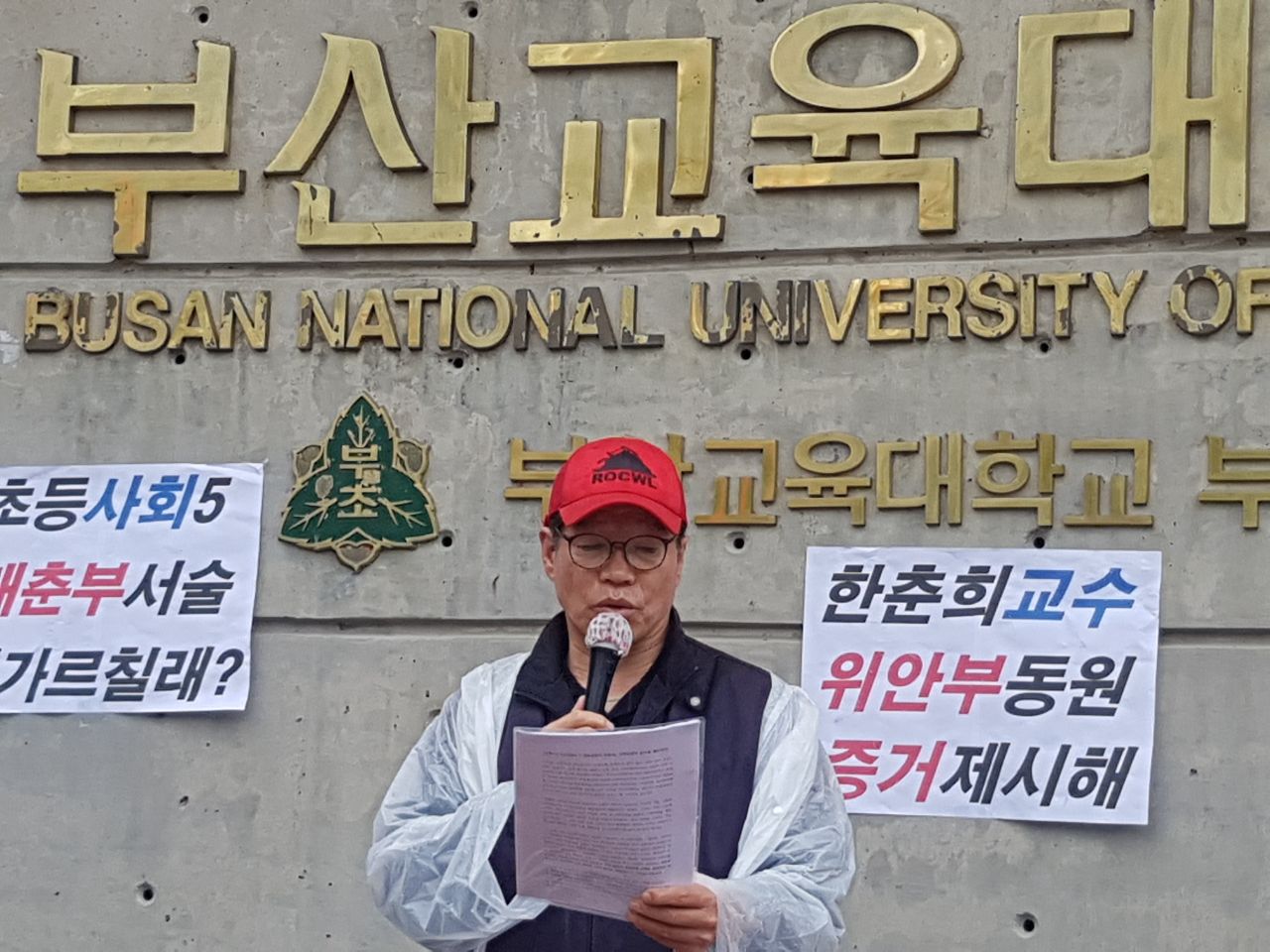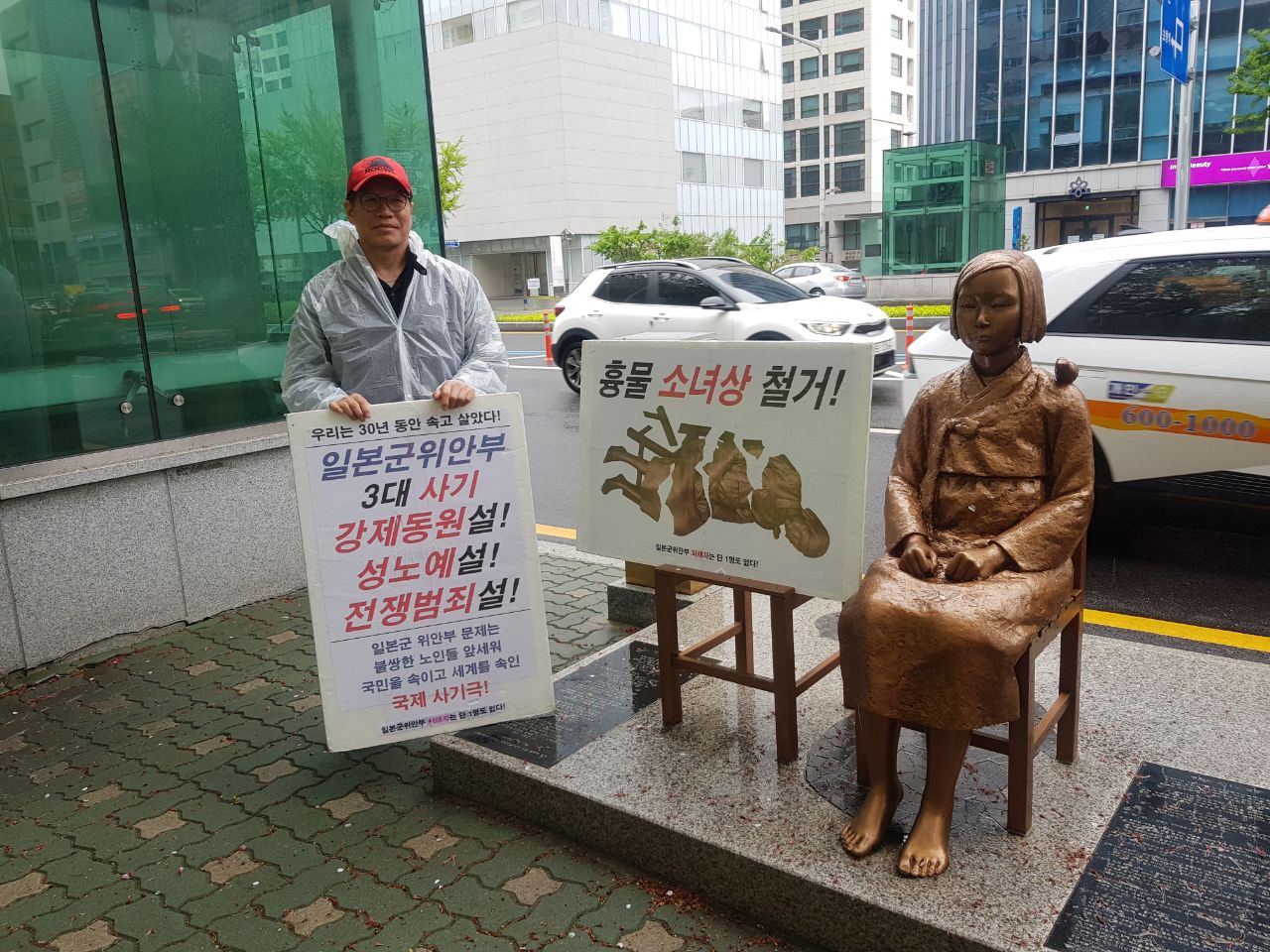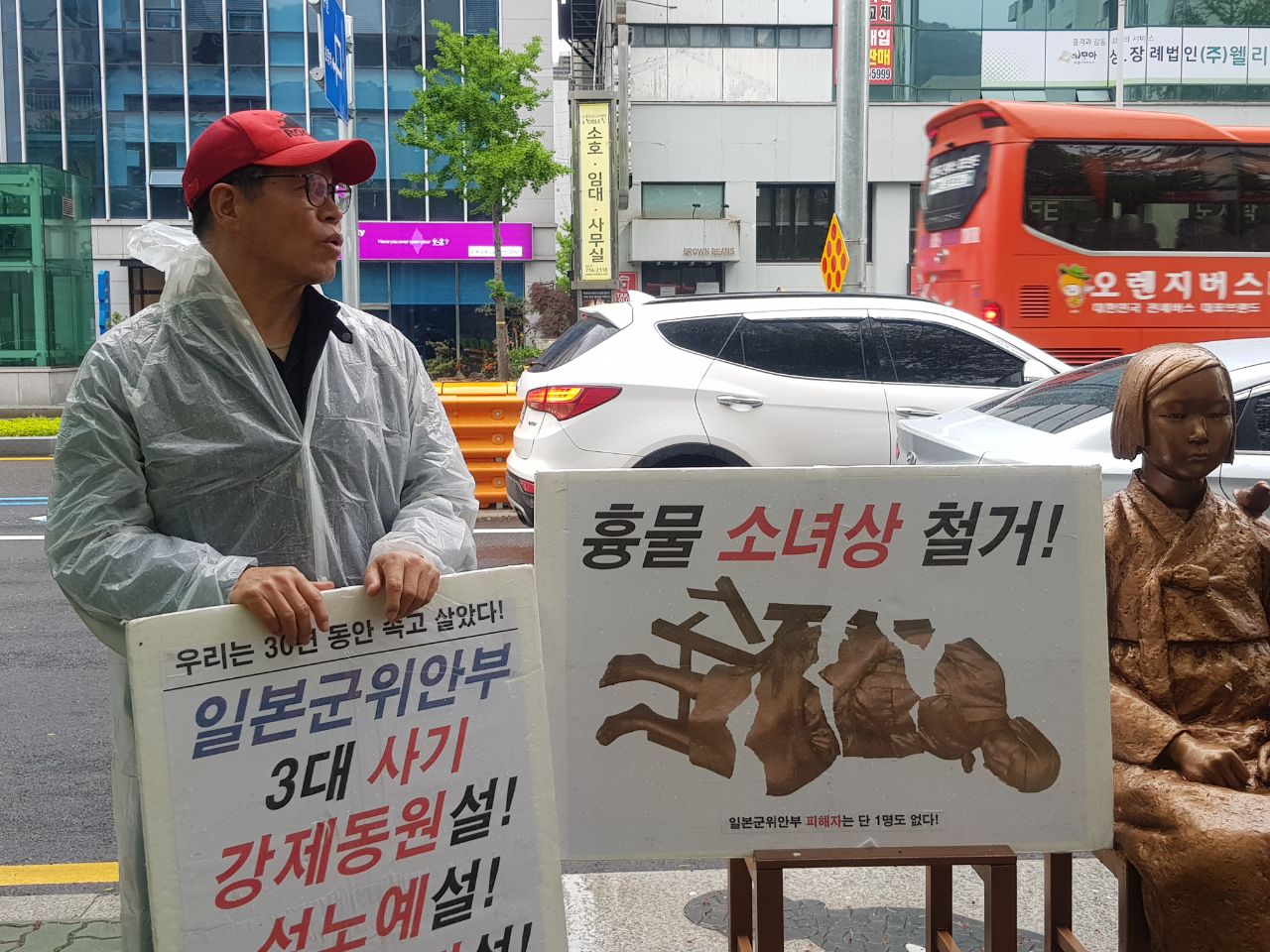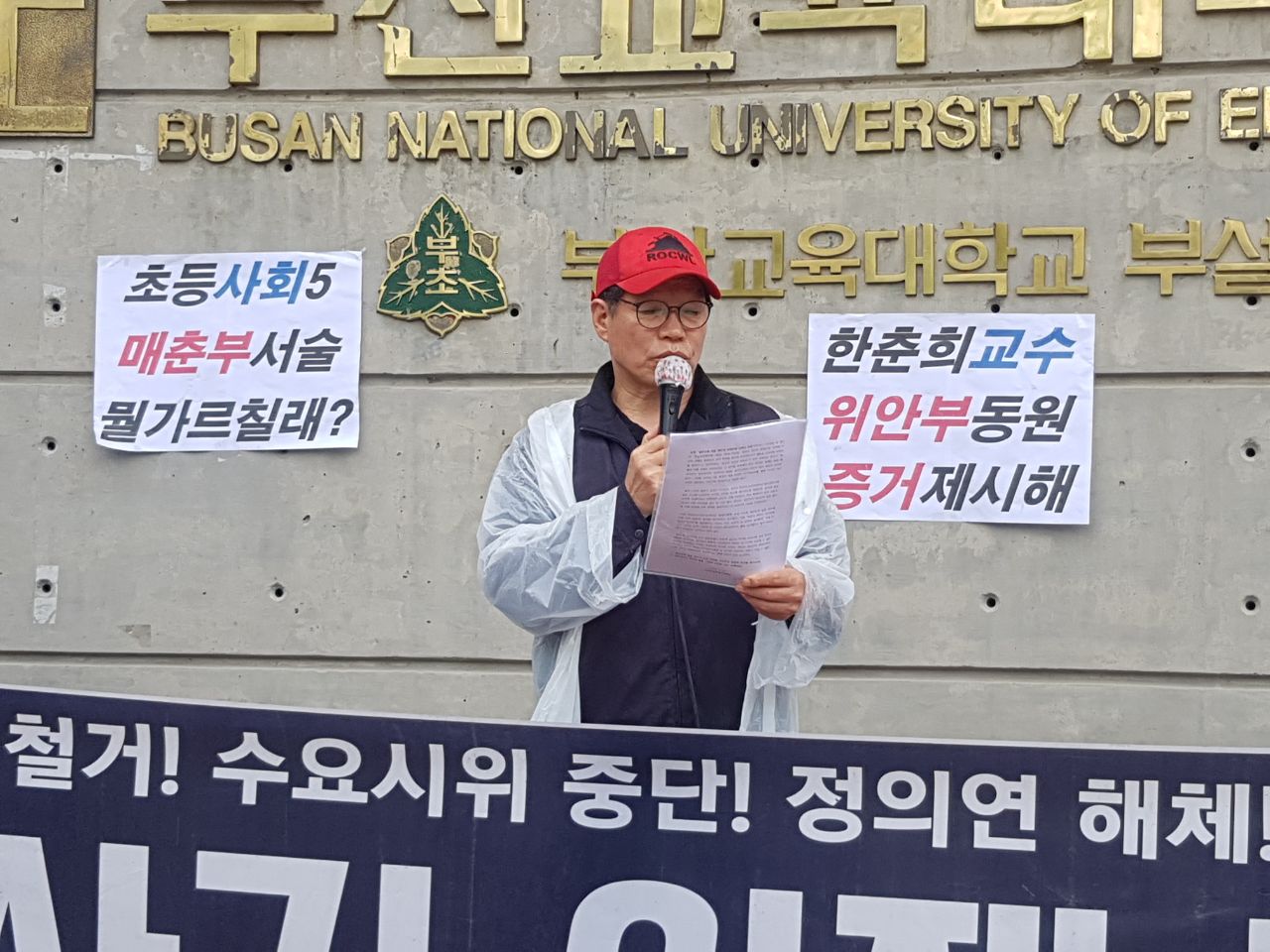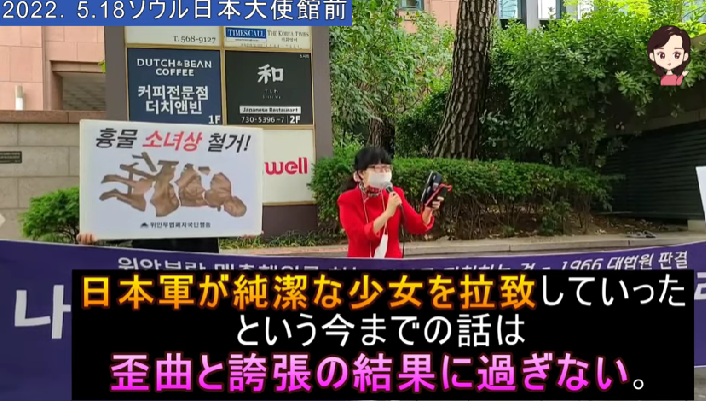
2022年5月18日ソウル日本大使館前にて、韓国市民団体「慰安婦法廃止国民行動」の幹事 朴セウオンさん(女性)の演説をご紹介します。
国民行動の皆さんは、日本を糾弾する正義連(元挺対協)水曜デモに対抗して活動を続けています。
[ 動画から文字起こし] *****************************
「慰安婦法廃止国民行動」幹事 朴セウオンさん演説
私は最近facebookでナ・ヨンジュンさんという方で、実際にお目にかかったことはありませんが、
ナ・ヨンジュンさん慰安婦イ・ヨンス(李容洙)と正義記憶連帯について評価した文をfacebookで読みました。
個人的にはこの方をよく知らないのですが、文章を読んで私も本当にびっくりしました。
文章の内容があまりにも鋭く正確なので皆さんに紹介しようと思います。
ただ時間の関係上(文章がとても長いので)内容のうち一部を整理、修正してご紹介します。
【 題名「イ・ヨンスと正義連、慰安婦叙事と運動の破綻」
※叙事:フィクションと言う意味に近い言葉
私はイ・ヨンスを純粋な被害者と規定してはならないと思う。
イ・ヨンスは正義記憶連帯(旧 挺対協)とともに慰安婦歴史を作ってきた主役だからである。
主役!主人公ですね。
正義連が今のように成長できた最大の理由は強烈なる叙事にある。
この叙事は、「純潔な娘が性奴隷に連れて行かれた」という極端な悲劇なのである。
そんな彼女らが、「今や沈黙を破って反日の闘士になった」という劇的な反転を意味している。
イ・ヨンスの口述証言と相次ぐ記者会見は、昨年は記者会見を2回もしましたね。
この叙事に忠実だ。
「慰安婦時代に対するイ・ヨンスの口述は、次第に強制性を強調する報告に変わった」 】
この方も証言が変わってたことを認めてますね。
【 特にイ・ヨンスの口述証言はこの叙事に忠実なのだ。
正義記憶連帯の不正を暴露する記者会見で、イ・ヨンスは自らを「女性人権運動家」としながら、自分に「立派だ」という表現を何度も使った。
このようなイ・ヨンスの叙事はすなわち、正義記憶連帯の叙事でもあるのだ。
ユン・ミヒャンは慰安婦、金福童氏の臨終する際に(金福童氏は亡くなられました)「日本に対する怒りを表現した」と明らかにした。
これもやはり、「純粋な少女が性奴隷になり、続いて強い反日闘士に変身する」叙事構図と一致する。
この30年間、イ・ヨンスと正義連はこうした慰安婦叙事を媒介とする共生関係を維持してきた。
特にイ・ヨンスは「被害者証言」という絶対的な言語を用いて、このような慰安婦叙事を「事実」として作り上げ、正義連はその「事実」を拡大・再生産したのはもちろん、仏教の経典のようにバイブルのように定型化してその組織をさらに育てていった。
しかし、多くの慰安婦出身の女性たちは、このような彼らが作った叙事とは程遠い「実存」を生きた。】
事実はほど遠いと、この方も仰ってますね。
【 実際、慰安婦になる経路は彼ら(正義連)の主張とは異なり実に多様だった。】
多分この方は慰安婦に対して色々特に証言集を勉強されたのだと思います。
私もびっくりしました。
【 日本軍が純粋な少女を拉致していったという今までの話は歪曲を誇張の結果に過ぎない。
1997年に日本から提供されたアジア女性基金を受けようとする慰安婦出身の女性たちに、衝撃的なことには当時ユン・ジュンオク挺対協(現・正義連)代表は「アジア女性基金を受け取るならば、自ら願って行って、税金も払って官で許可を受けた職業女性という公娼になるのだから、あなたたち自らが公娼になるのだ」と捨てセリフを言って騒ぎ立てたのです。
驚きますね!
その方たちがかわいそうで、その方たちの人権のためならば、その方たちの意志を尊重することが正しいですね。
それが慰安婦出身の方達の真の人権ではありませんか。
ところが自身(元挺対協代表ユン・ジュンオク)が作った叙事通りにせず、アジア女性基金を受領した。
本当に慰安婦のおばあさんたちは貧困な方たちが多かったんです。生活が大変な、、、
おばあさんたちがどう決めたとしても、おばあさんたちの決定(基金を受け取ること)を受け入れなければならないのに「アジア女性基金を受けたなら、自ら進んでいった」ことになり、「公娼だということを自らが認めることになる」と捨てセリフを言うのでしょうか!?
これが正義連の前身だった挺対協代表ユン・ジュンオクの実体です。
すなわち慰安婦たちの人権のためだと言った挺対協さえもこのように、彼らが作った叙事に合わない慰安婦の実像を捨ててしまったことだ。
このように慰安婦叙事を共に作っていったイ・ヨンスと正義記憶連帯の間に葛藤が生じた理由は、叙事の真偽の有無ではない。
誰が叙事を独占するかの問題だ。
イ・ヨンスにとってこの叙事は自分をはじめとする慰安婦だけのものでなければならなかった。
一方、正義記憶連帯側はこの叙事を絶対に共有しなければならなかったのである。
何故なら売って儲けたいからなのである。
お金になるから。
1400回を超える水曜集会ごとに正義連は慰安婦を広場に展示した。
大衆の前で慰安婦たちは正義記憶連帯の望んでいる物語を詠み、正義記憶連帯はお布施袋を揺らした。
このように稼いだ金のうち、慰安婦のために使った金はわずか18.7%に過ぎない。20%にも満たないということですね。
なのでユン・ミヒャンは今、調査を受けている最中です。
このように正義連は自分たちがデビューさせた「闘士」たちをピエロのようにこき使ったのだ。
その上、慰安婦らはそのように受け取った優良な小銭さえも「寄付」という名前で吐き出さなければならなかった。
そのうちの一部は、市民団体の活動家の子供たちに奨学金という名目で配分されたりもした。
衝撃的です。
2004年、ムングンファ会所属の慰安婦おばあさんは、挺対協をこのように糾弾した。
慰安婦のおばあさんたちが自ら進んで正義連(元・挺対協)を糾弾したことをご存じですか?
「あなたたちはいつ死ぬか分からない慰安婦たちを歴史の舞台で物乞いとして売り続け私腹を肥やした悪党たちだ。」と言ったのです。
慰安婦のおばあさんたちが自ら正義連を物乞いとして売った悪党だ、と表現したのです。
これは新聞記事を読めばたくさん出ています。
「悪党たち・・・」
これでも慰安婦のための、人権のためだと言えますか?
今、全国では少女のイメージで立てられた少女像が150体もあります。
一つ5000万ウォンだとしても(全部で)75億です。75億!
一つ7000万ウォンだとしたら100憶を超えます!
このように銅像を建てるお金があったとしても生きている慰安婦たちにはケチだった。
いったい正義連は市民団体なのか、祭礼団体なのか!?
この事実一つだけでも正義記憶連帯は解散しなければならない。
イ・ナヨン(正義連代表)は正義記憶連帯の運動が30年間続いてきた世界的な運動だとし、声を荒げた。
そのように彼女が誇る水曜集会について、2004年ムグンファ会のおばあさんたちはこのように評価した。
「水曜集会を持続してこそ挺対協という船が航海でき、自分たちのアイデンティティを維持できるからだという事実。国内にいる慰安婦のおばあさんたちが一様に水曜集会を敬遠する理由がまさにそこにあります。」
これは私の話でなくムグンファ会のおばあさんたちの声です。
真実?を叫びながら真実を畏れ、協商を叫びながら協商を拒否し、慰安婦当事者のためだと言って当事者を脅かし、当事者がするなという運動を当事者の名前で行った。
正義連にとって慰安婦とは何か。
まさに黄金の卵を産む老婆だった。】
金柄憲所長 演説
「挺対協、正義連の慰安婦の活動」を反対した人の中にシムミジャ氏がいます。
シムミジャ氏が日本での最高裁判所での裁判で勝訴したという話がありますが、これは嘘なのです!
その裁判でシムミジャ氏は慰安婦の被害者として認定されたのではありません。
なによりも、シムミジャ氏は本人が「日本軍慰安婦被害者だ」と何回も言いましたが、シムミジャ氏は「日本軍慰安婦被害者」ではありません。
シムミジャ氏だけでなく、全部みな!!
特にシムミジャ氏という人は、「日本に地図に花を描きなさいと言われて、桜を描かなくてムグンファを描いたので、警察に連れて行かれて暴力されて性暴力を受けて目が覚めたら日本だと」と言うのです。
そして日本で慰安婦生活をしたと言ったのですが、日本には日本軍慰安所がありません。
嘘なのです!!
そして慰安婦にはそのように暴力したりはしないのです。
慰安婦は慰安所の主人と雇用契約を結んで契約の内容に従って決められた場所で仕事をするのであって、無差別的に暴力されてり、電気拷問されたり、これみんな嘘なのです!!
こんなことで国民を騙す集団がまさしく正義連、挺対協、ユン・ミヒャン、ユン・ジュンオクです。
国民は今や目を覚まさなければなりません。
以上
*************************************************************
【金柄憲所長、国民行動への支援】
Paypal cleanmt2000@gmail.com 金柄憲所長、国民行動への支援
チャンネルfujichan (国民行動に送金します)
後援口座 ゆうちょ銀行
店名 五五八
店番 558
口座番号 2629662
ミヤモトフジコ
【チャンネルfujichanへの後援口座】 (個人)翻訳頑張ります。
店番098
山口銀行 5096982
ミヤモトフジコ
